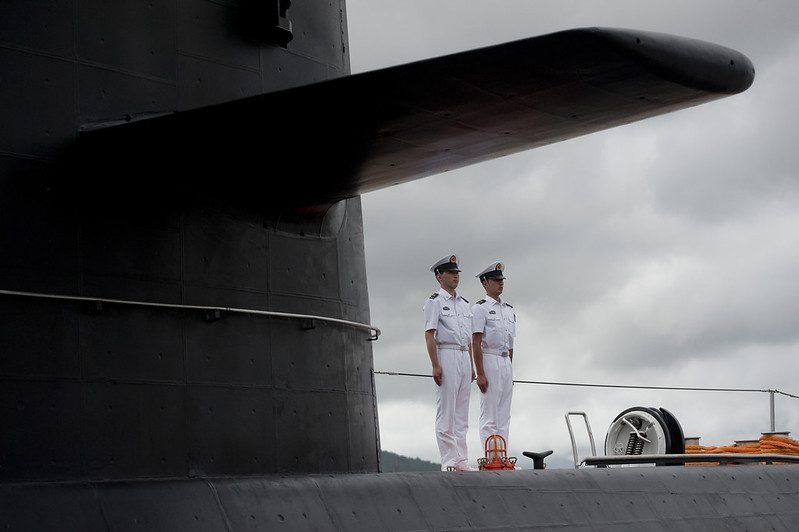This article is co-published with our partner 9DASHLINE.
In 2017, Thailand negotiated a USD 390 million deal with China for an S26T submarine, an export version of China’s Type 039A (Yuan class), with an option to buy two more. The contract with China Shipbuilding & Offshore International Company stipulated delivery in 2024. In 2020, the Royal Thai Navy announced its intentions to exercise that option and proceed with the purchase of two additional submarines. But amidst the COVID-19-induced recession, there was a public outcry that forced the navy to forestall its plans. Plans to buy two new submarines resurfaced in 2021 but, again, faced public criticism. In July 2021, the Prime Minister put the deal for the additional submarines on hold again, which raised the unit cost of just one submarine to USD 403 million.
Yet it was not the public backlash or parliamentary scrutiny over the military’s purchase of high-end weaponry amidst a continued economic slowdown that torpedoed the deal. Nor was it the military’s inability to provide a strategic rationale for the submarines in the first place; the Gulf of Siam is too shallow for submarines to operate effectively with modern anti-submarine warfare capabilities. And while the water is sufficiently deep in the Andaman Sea, it begged the question: for use against which other country’s navy? What maritime threat does Thailand face that surface ships cannot handle more effectively and cheaply?
It was clear that this was yet another Veblen good, like the Thai navy’s aircraft carrier that has no planes, which mostly sits tied up at the pier at Sattahip naval base, rusting away. But since the military coup of 2014, the Thai military usually gets its way regardless of strategic rationale.
Berlin wades in
But what sank the deal was actually Germany, which is now preventing the export of German-made MTU396 diesel engines that are reportedly being used in the submarines by Chinese manufacturers. Germany cited European Union export controls on China. This is curious as Germany has long ignored those restrictions, and has exported more than a hundred dual–use engines to China. Germany could convince itself that the engines were not being used for China’s rapidly growing submarine fleet. Who gets access to Chinese submarines to investigate whether they are illegally using German-built engines?
In early 2022, Germany’s defence attaché in Bangkok, Philipp Doert, announced that Berlin was restricting the export of the three engines, putting the entire deal at risk. “China did not ask/coordinate with Germany before signing the Thai-China contract, offering German MTU engines as part of their product”, he stated. This should also be seen as Germany’s hardening stance on China due to the latter’s excessive maritime claims and criticism of NATO.
China has offered to use indigenously-built engines for the submarines but the Thais have so far rejected China’s notoriously loud engines and demanded that the original contract be honoured. More importantly, the Yuan class S-26T submarines were designed around the German engines, so it’s not a simple matter of replacing one with another. Without German acquiescence, it seems highly unlikely that Thailand’s submarine ambitions will be met anytime soon. China has offered to sell Thailand a pair of used Yuan-class submarines in lieu of the one new submarine, but Bangkok has thus far rejected the offer. The two sides are continuing their negotiations.
This problem raises larger questions about China’s ability to serve as a reliable arms supplier in the region. China has moved from small arms to armoured vehicles and surface warfare vessels. It supplied Thailand with its new main battle tanks, armoured personnel carriers, and naval vessels, including a USD 200 million Type 071E amphibious transport dock. It sold Malaysia four littoral mission patrol craft. Should the submarine deal with Thailand proceed, it would put China in direct competition with the Russians, Germans, French, and South Koreans in Southeast Asia’s growing submarine market.
Thailand’s tilt towards China comes as no surprise. Hit by sanctions and diplomatic opprobrium following the military’s 2006 and 2014 coups, the military-backed governments reached out to China. Thailand’s military and ultra-royalist elites see democracy not just as a threat to their own political power, but as a gateway to republicanism, i.e. a threat to a pillar of the Thai nation. As such, Thailand’s authoritarian regime has adopted Chinese-style cyber laws and increased the policing of the internet.
Certain engagements with the United States have been curtailed or dialled back, and all branches of the Royal Thai Armed Forces now have regular bilateral training exercises with their PLA counterparts. Today, China has surpassed the United States to become Thailand’s largest weapons supplier.
What are the implications?
All this raises three important questions regarding the seemingly stalled submarine deal. First, does this impasse harm Sino-Thai relations? If Thailand does not succumb to Chinese pressure and refuses to buy the submarines with Chinese-built engines, and China refuses to repay the money the Thais have already put down, then yes. But barring that, no. Prayut Chan-o-cha, the Thai prime minister, has explicitly stated that he will not allow the deal to hurt the burgeoning relationship.
While it would be a setback for the Thai Navy’s ambitions, it should have no discernible impact on bilateral relations. Since the submarines had no strategic imperative, it doesn’t leave Thailand militarily vulnerable. It simply means that Thailand doesn’t have a weapon system that its ASEAN partners have.
Economically there is too much at stake. China accounts for roughly 12 per cent of Thailand’s exports and 22 per cent of its imports. While Thailand has largely eschewed BRI projects and has very low debt levels to China, China is still an important investor and economic partner. Thailand’s political orientation, especially as the military-backed government will soon have to contest elections that it will likely manipulate, puts a premium on relations with Beijing.
Second, does this hurt China’s status as a reliable arms supplier in Southeast Asia? Probably not. While it might lessen the chances of selling submarines to other governments in Southeast Asia, that was always going to be a fairly hard market to break into. Russia, France, Germany, and South Korea already control the market. Though cheaper, China’s submarines are technologically inferior, especially in their propulsion systems.
Public opinion and civil society: shaping Indonesia’s South China Sea Policy?
Public opinion should force the Indonesian government to consider and adjust its policies and responses to China in the South China Sea.
But for other, non-submarine systems, China reliably offers low-cost weaponry to the cash-strapped governments in the region. It imposes no human rights conditions or threat of sanctions, unlike the United States. Their procurement process is easy and very prone to corrupt practices, which endears itself to some of the militaries of Southeast Asia.
Third, does the deal have any impact on Bangkok’s relations with Washington? Perhaps. It’s no secret that US-Thai relations are anaemic. The alliance has suffered from the lack of any shared perception of threat. Thailand simply does not see China as a threat. And with regards to a host of other issues, including the ongoing crisis in Myanmar started by last year’s military coup, there is little strategic convergence between the allies. Thailand’s democratic setbacks and inward orientation under military rule have ensured that Thailand is no longer a reliable diplomatic proxy for the United States in the region.
Washington has shown its displeasure. For periods it has had no ambassador to Thailand. The Biden administration did not include Thailand in its Interim National Security Guidance report, though it mentioned both Vietnam and Indonesia. Senior leaders, such as the US Vice President Kamala Harris, and the Secretary of Defence Lloyd Austin, overlooked Thailand during their trips to Southeast Asia. The Secretary of State Antony Blinken was scheduled to visit Bangkok last December but cancelled due to a COVID-19 case amongst his staff.
Thailand has not condemned Russia’s illegal invasion of Ukraine, upsetting Washington. Indeed, Thailand’s political elite, military, and ultra-royalists remain staunchly pro-Putin, whom they see as sharing a very similar cherry-picked and nostalgic view of Thai history and culture, and contempt for democracy and a free press.
Not everyone in Thailand is happy with the breakdown of the alliance. And some in the Thai military understand how important it is to keep the United States involved and engaged in regional security. They have made sure that they are still at least some large arms purchases, including eight Apache AH-6 reconnaissance and light attack helicopters, a USD 103 million deal. In March, the Thai military leadership signalled their ambitions to purchase F-35 fighter planes to replace their ageing fleet of F-16s. They have earmarked around USD 415 million for four fifth-generation jets. It is not clear, though, whether the United States is willing to sell Thailand the F-35, especially with Bangkok’s current close relationship with Beijing. China, which recently exported single-engine multirole J-10CE fighters to Pakistan, could be interested in thwarting the F-35 deal and selling the J-10CE to Thailand.
There are also those in the Thai military who are concerned about an over-reliance on China, as well as the possibility of a permanent PLA presence in neighbouring Cambodia, where the Chinese are supposedly building an airfield at Dara Sakor and allegedly secured access to the Ream navy base, where dredging is now ongoing. These facilities would greatly enhance China’s intelligence, surveillance, and reconnaissance capabilities towards Thailand, in particular the main naval base at Sattahip.
All this could be an opportunity to try to repair relations with Washington, which would see Thailand walking away from a major arms deal with China as a victory of sorts. But overall, Thailand’s political and diplomatic orientation remains more closely in line with Beijing.
 Facebook
Facebook  Twitter
Twitter  Soundcloud
Soundcloud  Youtube
Youtube  Rss
Rss 



